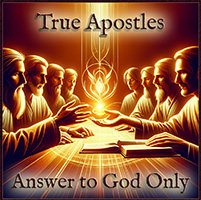Second Corinthians 12:11–21 . . .
Pastoral Concerns
As we approach the conclusion of Paul’s second epistle, we must remember these key facts. Paul founded the Corinthian church. He was the Corinthians’ spiritual father, having taught them how to live as Christians. But, after he’d left, some smooth, flowery, impressive, itinerant teachers came in and began to teach other things. Soon, the Corinthians began to see Paul as an ignorant rustic who not only didn’t know very much, but couldn’t even speak well of what he knew. Paul was forced, as we recently noticed, to compare his record with that of those false apostles. Thankfully in every way he outshone these phonies.
[Note: Click the link to This Week's Passage near the bottom of this page to read today’s Scripture.]
Apostle Paul concludes this section of chapter 12 by highlighting “The Three Signs of a True Apostle.” (Consider copying the list below, keeping it handy for you to apply these signs for those you see on TV or read of in books.) Starting in the first three verses (vv. 11–13, shown below), Paul indicates that there are certain marks or signs of a true apostle, which he’d performed for his friends in Corinth. He expresses surprise that they didn’t defend him when the phony apostles showed up. After all, they’d already seen Paul’s true apostle signs, so they should have recognized them and come to his defense. Because they didn’t, because they were so easily deluded and deceived, Paul found it necessary, albeit embarrassingly, to defend himself. Such signs or mighty works had symbolic meaning and would alert people to them. Clearly, only God could do them; man cannot act in this realm. Now, what are these signs?
First sign of a true apostle: having authentication. He writes in v. 11, “I am not in the least inferior to the ‘super-apostles’,” followed by “even though I am nothing.” That’s the mark of a true servant of Christ: the ability to say both of those things and for both of them to be equally true. When Paul says, “I am not in the least inferior,” he means: Everything I am in Christ, everything that Christ can do through me makes me equal to anything they can do. If God tells me to do something I can do it, obeying his word, following his precepts, doing what he asks. (This is reminiscent of Paul’s bold declaration in Philippians 4:13: Click the image to the right.) The he adds v. 13, saying in effect: Did you reject all this only because I failed to let you support me financially? I’m sorry. I should have let you do that. Forgive me. That’s a reference to all the emphasis they’d put upon the fact that he supported himself while he was with them, instead of living, as those false apostles did, off “the fat of the congregation.” Well, such authentication is the first mark of a true apostle.
Second sign of a true apostle: giving without restraint. In vv. 14–15, Paul plainly states that he gave himself in selfless love because he’s the parent and they’re the children whom he’d led to Christ. Parents have the responsibility to provide for the children, not to expect the children to support their parents. The second great mark of a true servant of Christ, a true apostle, is that he gives himself without restraint to those to whom he ministers; he doesn’t ask for anything back from them. What a contrast that is with false apostles! How upset they get when you don’t accept them or donate to their ministry.
Being suspicious of Paul, the false apostles press this further. In v. 16 Paul writes: “Be that as it may, I have not been a burden to you. Yet, crafty fellow that I am, I caught you by trickery!” The false apostles couldn’t find fault with what he did, so they argued: Well, he’s only doing it because he wants to allay our suspicions. When he gets us eating out of his hand, then he’s going to take advantage of us. But Paul responds accordingly in vv. 17–18: Just name one time when I did that! What a selfless attitude the apostle demonstrates here, challenging them to name even one time when he took advantage of his relationship by expecting them to give something back to him for what he’d been freely pouring out to them. Likely, Paul effectively silenced the opposition in Corinth in that regard.
Third sign of a true apostle: being answerable only to God. Vv. 19-21 highlight the essence of answering only to God, not to the congregation. A true servant of Christ doesn’t need to always justify himself before those to whom he ministers. It’s nice to have their approval, but it isn’t necessary, so long as he has God’s approval. And because Paul doesn’t require their approval, he won’t fail to do what’s necessary when he returns to them; he’ll deal with the reality of what he finds, that is, what’s actually happening with the congregation.
Evidently that isn’t a pleasant picture. There were certain “wrong attitudes” that he anticipated he’d find, i.e., “discord, jealousy, fits of rage, selfish ambition, slander, gossip, arrogance and disorder.” These things destroy the witness and testimony of a congregation. Paul says, When I return to you, I’ll deal with those wrong attitudes, because I don’t require your approval of me; therefore I’ll deal honestly with what I find when I arrive. Not only were there wrong attitudes, their conduct was very wrong. Paul speaks of “impurity, sexual sin, and debauchery,” attitudes that deal with the realm of sexuality and its purposes. How faithfully the apostle dealt with these matters of sexual impurity (in both of his epistles) in a place and time where they were widely accepted as being normal.
A Christian is not to do what everybody else does. He or she is to be different, because Christ has made the difference in our lives. The apostle emphasizes that, saying that he’ll deal honestly with it when he returns. He’s free to do so, because, as a true apostle, he’s humble, unrestrained, and answerable only to God, not to the congregation.
The marks of a true apostle: (1) Certain authentication that only the original apostles had; (2) a selfless spirit that loves yet doesn’t demand anything in return; and (3) a true sense of accountability to God alone, never ultimately to the congregation or any man.
Believers: If we base our faith on men with these qualifications, we’ll find ourselves standing firmly, despite the shaking that goes on in our days.
Note: 2nd Corinthians encourages believers to embrace and follow the way of Jesus that transforms lives and values generosity, humility, and weakness. In chapters 10–13, Paul presents these four elements:
Paul defends his authority (ch. 10) | The false apostle and Paul (ch. 11)
Paul’s vision and thorn in the flesh (ch. 12) | Paul’s final advice and greetings (ch. 13)
› Watch BibleProject’s superb animated video (2 min.) that highlights Paul’s messages in these four chapters.
† Summary and Key Points of 2 Corinthians 12:11–21
Here’s my summary of this eleven-verse passage.
In this passage, Paul concludes his defense of his apostleship to the Corinthians. He expresses disappointment that the church didn’t defend him against false apostles, even though he’d demonstrated the true marks of an apostle — signs, wonders, and patient ministry among them. He emphasizes that he never burdened the Corinthians financially and assures them of his genuine love and sacrificial care. He warns of his upcoming third visit, expressing concern that he may find persistent sin and lack of repentance in the church. His ultimate goal is the spiritual strengthening and edification of the believers, not personal gain or vindication.
Its four key points:
1. Paul’s Apostolic Credentials and Disappointment (vv. 11–13)
• The apostle regrets having to “boast” but says the Corinthians forced him to do so, since they should have commended him.
• He reminds them he’s not inferior to the so-called “super-apostles,” even though he considers himself nothing.
• The true marks of an apostle — signs, wonders, and miracles— were performed among them.
• He highlights that he never burdened them financially, unlike others.
2. Paul’s Parental Love and Sacrifice (vv. 14–18)
• Paul prepares for his third visit, assuring them he’ll not be a financial burden.
• He compares his care to that of a parent for children, willing to “spend and be spent” for their souls.
• Next, Paul addresses accusations of deceit, affirming that neither he nor his associates (like Titus the Gentile, who was a reliable, ethical, and consistent partner in Paul’s ministry) exploited the church.
3. Purpose of Paul’s Defense: Edification (v. 19)
• Paul clarifies that his defense is not self-justification but is spoken before God in Christ for their strengthening and edification.
4. Warning Against Sin and Call to Repentance (vv. 20-21)
• Paul expresses fear that he’ll find ongoing sins — discord, jealousy, rage, selfish ambition, slander, gossip, arrogance, disorder — when he visits.
• He worries he’ll be humbled and grieved if many haven’t repented of impurity, sexual sin, and debauchery.
• Paul’s concern is for the church’s holiness and readiness for his visit.
Paul’s heart is for the Corinthians’ spiritual well-being. He urges them to recognize his genuine ministry, repent of sin, and pursue unity and holiness as he prepares to visit them again.
- Q. 1 How have the false “super-apostles” distorted Paul’s ministry (see also 2:17; 11:7)?
- Q. 2 How would you feel about visiting a ministry you love that's behaving like what's revealed in vv. 20–21?
- Q. 3 To whom is God leading you to minister? How can you demonstrate to them the spirit of vv. 14–15?
- Q. 4 What was one way your parents sacrificed for you? How did you feel about that sacrifice then? Now?
2 Corinthians 12:11–21
New International Version (NIV)
[You can view it in a different version by clicking here; you can also listen to chapter 12.]
Paul’s Concern for the Corinthians
11I have made a fool of myself, but you drove me to it. I ought to have been commended by you, for I am not in the least inferior to the “super-apostles,” even though I am nothing. 12I persevered in demonstrating among you the marks of a true apostle, including signs, wonders and miracles. 13How were you inferior to the other churches, except that I was never a burden to you? Forgive me this wrong!
14Now I am ready to visit you for the third time, and I will not be a burden to you, because what I want is not your possessions but you. After all, children should not have to save up for their parents, but parents for their children. 15So I will very gladly spend for you everything I have and expend myself as well. If I love you more, will you love me less? 16Be that as it may, I have not been a burden to you. Yet, crafty fellow that I am, I caught you by trickery! 17Did I exploit you through any of the men I sent to you? 18I urged Titus to go to you and I sent our brother with him. Titus did not exploit you, did he? Did we not walk in the same footsteps by the same Spirit?
19Have you been thinking all along that we have been defending ourselves to you? We have been speaking in the sight of God as those in Christ; and everything we do, dear friends, is for your strengthening. 20For I am afraid that when I come I may not find you as I want you to be, and you may not find me as you want me to be. I fear that there may be discord, jealousy, fits of rage, selfish ambition, slander, gossip, arrogance and disorder. 21I am afraid that when I come again my God will humble me before you, and I will be grieved over many who have sinned earlier and have not repented of the impurity, sexual sin and debauchery in which they have indulged.


